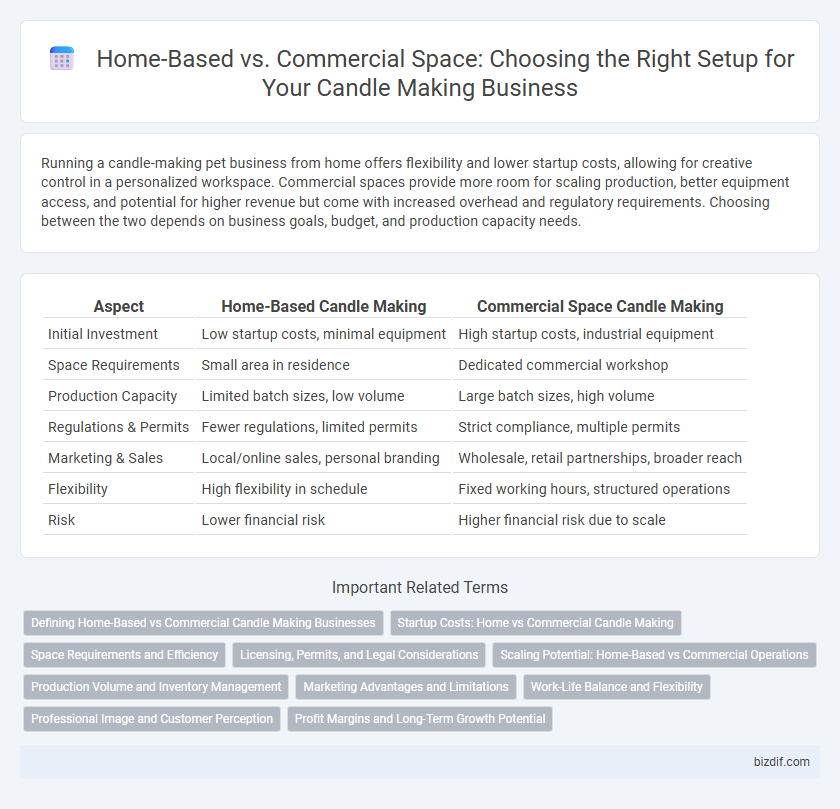Running a candle-making pet business from home offers flexibility and lower startup costs, allowing for creative control in a personalized workspace. Commercial spaces provide more room for scaling production, better equipment access, and potential for higher revenue but come with increased overhead and regulatory requirements. Choosing between the two depends on business goals, budget, and production capacity needs.
Table of Comparison
| Aspect | Home-Based Candle Making | Commercial Space Candle Making |
|---|---|---|
| Initial Investment | Low startup costs, minimal equipment | High startup costs, industrial equipment |
| Space Requirements | Small area in residence | Dedicated commercial workshop |
| Production Capacity | Limited batch sizes, low volume | Large batch sizes, high volume |
| Regulations & Permits | Fewer regulations, limited permits | Strict compliance, multiple permits |
| Marketing & Sales | Local/online sales, personal branding | Wholesale, retail partnerships, broader reach |
| Flexibility | High flexibility in schedule | Fixed working hours, structured operations |
| Risk | Lower financial risk | Higher financial risk due to scale |
Defining Home-Based vs Commercial Candle Making Businesses
Home-based candle making businesses operate primarily within a residential setting, enabling entrepreneurs to produce small batches with lower overhead costs and flexible schedules. Commercial candle making businesses typically occupy dedicated industrial spaces designed for large-scale production, equipped with specialized machinery and adhering to strict regulatory standards. The distinction influences factors such as production capacity, licensing requirements, marketing strategies, and scalability potential in the candle industry.
Startup Costs: Home vs Commercial Candle Making
Home-based candle making businesses typically have lower startup costs due to reduced expenses for rent, utilities, and permits compared to commercial spaces. Commercial candle making requires a significant investment in larger equipment, commercial-grade safety installations, and higher insurance costs. Evaluating these financial differences is critical for entrepreneurs seeking scalable growth while managing initial capital outlay effectively.
Space Requirements and Efficiency
Home-based candle making businesses require limited space optimized for small-scale production, often utilizing multi-purpose areas to reduce overhead costs. Commercial spaces provide dedicated zones for various production stages, enhancing workflow and allowing the use of specialized equipment that increases efficiency. Efficient layout design in commercial settings minimizes downtime between tasks, significantly boosting output compared to the constrained and flexible nature of home setups.
Licensing, Permits, and Legal Considerations
Home-based candle making businesses often require fewer permits and simplified licensing compared to commercial spaces, but local zoning laws must be carefully reviewed to avoid violations. Commercial spaces typically demand comprehensive business licenses, health and safety permits, and fire code compliance due to higher production scales. Understanding city regulations, such as fire marshal approvals and smoke emission controls, is essential to ensure legal operation regardless of business setting.
Scaling Potential: Home-Based vs Commercial Operations
Home-based candle making businesses often face limitations in production capacity and storage space, restricting their ability to scale rapidly. Commercial spaces provide larger areas equipped for higher volume manufacturing, enabling streamlined workflows and increased output to meet growing demand. Access to industrial-grade equipment and bulk raw materials in commercial operations further enhances scalability and cost-efficiency.
Production Volume and Inventory Management
Home-based candle-making businesses typically manage lower production volumes, allowing for flexible inventory control and reduced overhead costs. Commercial spaces support higher production volumes with specialized equipment, enabling efficient batch processing and bulk storage of raw materials and finished products. Effective inventory management in commercial settings relies on systematic tracking systems to balance supply chain demands and minimize downtime.
Marketing Advantages and Limitations
Home-based candle making businesses benefit from lower overhead costs and the ability to quickly adapt marketing strategies through social media and direct customer engagement. Limited space and resources can restrict product variety and large-scale promotional activities, impacting the brand's reach and scalability. Commercial spaces offer expanded production capacity and professional storefronts, enhancing brand image but requiring higher marketing budgets and strategic resource allocation.
Work-Life Balance and Flexibility
Home-based candle making businesses offer greater flexibility and improved work-life balance by allowing entrepreneurs to manage production schedules around personal commitments. Commercial spaces provide dedicated work areas that support higher volume production but often require fixed hours, which can reduce flexibility. Balancing the advantages of a home setup with the capacity of a commercial space depends on the scale of candle production and individual lifestyle priorities.
Professional Image and Customer Perception
Operating a candle-making business from a commercial space enhances professional image by providing a dedicated, clean, and organized environment that instills customer confidence. Customers often perceive commercial locations as more reliable and committed to quality compared to home-based setups, which may seem less formal or trustworthy. Investing in a commercial space can lead to increased brand credibility and higher sales through improved customer trust and professional presentation.
Profit Margins and Long-Term Growth Potential
Home-based candle making businesses benefit from lower overhead costs and higher profit margins due to reduced expenses on rent and utilities. Commercial spaces offer scalability and increased production capacity, enabling long-term growth through bulk orders and wholesale partnerships. Evaluating profit margins alongside growth potential helps entrepreneurs decide between maintaining a cost-effective operation or investing in expansion opportunities.
Home-based business vs Commercial space Infographic

 bizdif.com
bizdif.com